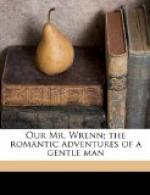Oh damn it, am I getting sentimental? You’ll
read this at Petit
Monsard over your drip & grin at your poor unnietzschean
barbarian.
I.
N.
CHAPTER VIII
HE TIFFINS
Mr. Wrenn, chewing and chewing and chewing the cud of thought in his room next evening, after an hour had proved two things; thus:
(a) The only thing he wanted to do was to go back to America at once, because England was a country where every one—native or American—was so unfriendly and so vastly wise that he could never understand them.
(b) The one thing in the world that he wanted to do was to be right here, for the most miraculous event of which he had ever heard was meeting Miss Nash. First one, then the other, these thoughts swashed back and forth like the swinging tides. He got away from them only long enough to rejoice that somehow—he didn’t know how—he was going to be her most intimate friend, because they were both Americans in a strange land and because they both could make-believe.
Then he was proving that Istra would, and would not, be the perfect comrade among women when some one knocked at his door.
Electrified, his cramped body shot up from its crouch, and he darted to the door.
Istra Nash stood there, tapping her foot on the sill with apologetic haste in her manner. Abruptly she said:
“So sorry to bother you. I just wondered if you could let me have a match? I’m all out.”
“Oh yes! Here’s a whole box. Please take ’em. I got plenty more.” [Which was absolutely untrue.]
“Thank you. S’ good o’ you,” she said, hurriedly. “G’ night.”
She turned away, but he followed her into the hall, bashfully urging: “Have you been to another show? Gee! I hope you draw a better one next time ’n the one about the guy with the nephew.”
“Thank you.”
She glanced back in the half dark hall from her door—some fifteen feet from his. He was scratching at the wall-paper with a diffident finger, hopeful for a talk.
“Won’t you come in?” she said, hesitatingly.
“Oh, thank you, but I guess I hadn’t better.”
Suddenly she flashed out the humanest of smiles, her blue-gray eyes crinkling with cheery friendship. “Come in, come in, child.” As he hesitatingly entered she warbled: “Needn’t both be so lonely all the time, after all, need we? Even if you don’t like poor Istra. You don’t—do you?” Seemingly she didn’t expect an answer to her question, for she was busy lighting a Russian cigarette. It was the first time in his life that he had seen a woman smoke.
With embarrassed politeness he glanced away from her as she threw back her head and inhaled deeply. He blushingly scrutinized the room.
In the farther corner two trunks stood open. One had the tray removed, and out of the lower part hung a confusion of lacey things from which he turned away uncomfortable eyes. He recognized the black-and-gold burnoose, which was tumbled on the bed, with a nightgown of lace insertions and soft wrinkles in the lawn, a green book with a paper label bearing the title Three Plays for Puritans, a red slipper, and an open box of chocolates.




